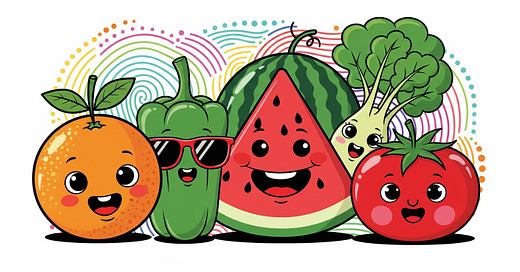Eating 5 cups of fruits and vegetables a day could improve sleep quality by 16% 🍎🍎
Hi and happy Tuesday! Here is this week’s longevity news.
Eating 5 cups of fruits and vegetables a day could improve sleep quality by 16%. Researchers found that each day’s diet was linked to “meaningful differences” in the subsequent night’s sleep. Those who ate more fruits and vegetables during the day were observed to have deeper, more uninterrupted sleep at night. Participants who ate healthier carbohydrates, like whole grains, also seemed to have better sleep, scientists observed. The change was observed within 24 hours.
Vitamin D May Help Slow Cellular Aging, Study Finds. The study, known as the VITamin D and OmegA-3 TriaL (VITAL), showed that people taking 2,000 IUs of vitamin D lost about 140 fewer base pairs from their telomeres than those taking a placebo—a small but statistically significant difference. Telomeres are regions of DNA at the ends of chromosomes that naturally shorten with age. Shorter telomeres have been linked to health risks such as heart disease and Alzheimer’s disease.
Long-lived people have the same crucial blood biomarkers, pointing scientists towards new anti-aging treatments. When participants were sorted into five groups for each biomarker, patterns starting popping out. Folks in the lowest bracket for total cholesterol and iron were less likely to hit 100 than those sitting midrange or higher. Meanwhile, creeping levels of biomarkers like glucose, creatinine, uric acid, and several liver enzymes quietly clipped the odds of joining the century club. Uric acid told perhaps the clearest story. In the group with the most modest readings, 4 percent reached triple digits; in the highest group, only 1.5 percent did.
Study finds common dietary supplement can flush out toxic forever chemicals from your body. Eating a fibre supplement derived from oats before each meal could flush out toxic forever chemicals from the body, a new study suggests. Per and polyfluoroalkyl substances, or PFAS, commonly known as forever chemicals, are widely used to make products like non-stick cookware, cosmetics, stain-resistant fabrics, firefighting foams, food packaging, and waterproof clothing. They persist in the environment for hundreds of years and are increasingly linked to a range of health conditions in humans, including decreased fertility, developmental delays in children, and a higher risk of some cancers.
What’s next?
My testosterone is not optimal. But I would like it to be. To better understand whether there might be an issue, I have taken tests of the key hormones for testosterone production: luteinizing hormone, follicle-stimulating hormone, prolactin, and sex hormone-binding globulin. I will share the results with you next week.
For any new readers: I am trying to live to (at least) 151. To get there, I follow 2 main principles:
Live a super-healthy life (based on what science deems positive for longevity)
Measure what’s going on in my body and tune any metrics that are off to become optimal
I also summarize interesting news and stories from the longevity space. And I share everything worth sharing with you.
If you enjoyed this newsletter, I would be very grateful if you gave it a ‘like’ (the ❤️ at the top).
Have a good day,
Johan
Here is an overview of all the tests I have taken so far:





